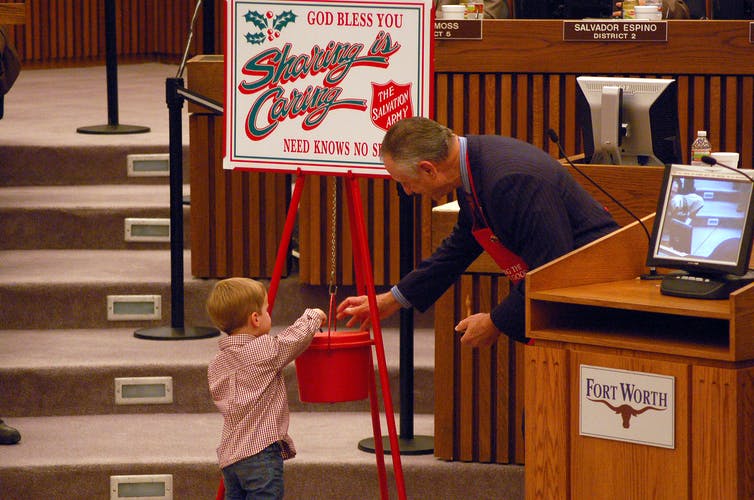Andrew Moran
libertynation.com
Economics Correspondent at LibertyNation.com. Andrew has written extensively on economics, business, and political subjects for the last decade. He also writes about economics at Economic Collapse News and commodities at EarnForex.com. He is the author of “The War on Cash.” You can learn more at AndrewMoran.net.
The Salvation Army will be struggling to help those in need this Christmas. How disappointing is the post-pandemic economy when one of the world’s oldest charitable organizations reports a significant increase in demand for its assistance? Not only that, but the Christian philanthropic entity revealed that it, too, is struggling. Rampant price inflation and the intensifying global supply chain crisis are hampering its ability to provide the philanthropic services for which it has been known and celebrated for decades.
Salvation Army Braces for Christmas Demand
The Salvation Army had a busy Thanksgiving, feeding thousands of people again this holiday. From the small towns in Massachusetts to the large urban centers in California, the charity served up hot meals to ensure fewer people went hungry this year.
While the Salvation Army continues the tradition of aiding the needy, it may be suffering the effects of an additional self-imposed burden. This year, it ventured into a critical race theory controversy by launching a “Let’s Talk About Racism“ initiative. According to some media reports, this new desire to appear “woke” has turned off a number of donors just when the organization needs them most.
The group has seen a dramatic increase in people requesting its services, despite the post-crisis economic “recovery.” Officials say it has not experienced this level of demand for its charitable services since the 2008-2009 financial crisis.
Meeting the escalating demand has been challenging. The Salvation Army is finding it harder to gather the necessary resources to complete its most basic obligations. Everything costs more these days, from the utensils to serve food to the ingredients to make the meals. Even if it possesses enough funds to cover higher costs, the international supply chain crisis has also limited the organization’s ability to get the tools it requires.
Salvation Army raises money using various mechanisms. One of its most ubiquitous methods is the red kettle and the bell ringer. Unfortunately, the organization is enduring a shortage of paid and volunteer bell ringers for the second consecutive year. And this could impact its Red Kettle campaign nationwide, causing it to fail to meet financial goals, throwing another wrench into its plans.
Everything about the latest developments involving the Salvation Army leads to one conclusion: The U.S. economy is not recovering as well or as fast as the White House seems to suggest.
Bidenomics Falling Short of Intentions
Americans have little confidence, it seems, in the U.S. economy. For example, the University of Michigan’s final Consumer Sentiment Index for November declined to 67.4, while the Consumer Expectations Index also dropped to 63.5. These bearish feelings about the U.S. marketplace are understandable, considering that price inflation is at a 30-year high, economic growth is anemic, real wages are down across the board, and the money in your wallet does not go very far in this current climate.
For much of the year, many different surveys have revealed a considerable number of Americans do not have enough money in their rainy-day funds to cover a financial emergency. Most Americans could not pay for a $400 or $1,000 unforeseen event, according to some polls. Moreover, the latest Bureau of Economic Analysis (BEA) data suggests that Americans’ personal savings are evaporating as their outlays exceed their income growth.
Greg McBride, a CFA and chief financial analyst at Bankrate, said in a statement this past summer:
“Americans’ emergency savings may not be in better shape after all. Just 1 in 6 households report having more emergency savings now than prior to the pandemic, and it is predominantly higher income households and those with fully funded emergency savings.”
Christmas is around the corner, and many Americans say they are ditching the gift-giving festivities this year, citing higher costs. Although a recent Deloitte survey discovered wealthy households are spending more on presents because of inflation, low-income households report spending less on gifts because of soaring food costs.
When U.S. consumers cannot even head to their local Dollar Tree to buy products for a buck, the country might be heading in the wrong direction.
Hard Times in Biden’s America
These are not the most flattering of economic conditions for any sitting president. But, if the post-COVID economy were performing well, why would the Salvation Army report more requests for help? In some ways, the United States is moving on from the coronavirus public health crisis. But, on the other hand, the consequences of governments shutting down world commerce – while printing and spending trillions of dollars – are rearing their ugly head. While Mr. Biden tries to assure the nation that “America is back,” the increasing strain felt by charitable organizations suggests the return to prosperity is a longer and more difficult road to travel than he is willing to admit.
Please share this article so that others can discover The BFD.

